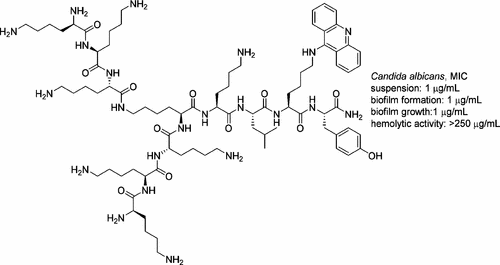当前位置:
X-MOL 学术
›
ACS Med. Chem. Lett.
›
论文详情
Our official English website, www.x-mol.net, welcomes your feedback! (Note: you will need to create a separate account there.)
Branched Peptides: Acridine and Boronic Acid Derivatives as Antimicrobial Agents
ACS Medicinal Chemistry Letters ( IF 4.2 ) Pub Date : 2017-07-17 00:00:00 , DOI: 10.1021/acsmedchemlett.7b00119 Jessica E. Wynn 1 , Wenyu Zhang 1 , Joseph O. Falkinham 2, 3 , Webster L. Santos 1, 3
ACS Medicinal Chemistry Letters ( IF 4.2 ) Pub Date : 2017-07-17 00:00:00 , DOI: 10.1021/acsmedchemlett.7b00119 Jessica E. Wynn 1 , Wenyu Zhang 1 , Joseph O. Falkinham 2, 3 , Webster L. Santos 1, 3
Affiliation

|
The emergence of microbial resistance presents a challenge in the development of next generation therapeutics. Herein, we report the discovery of branched peptides decorated with acridine and boronic acid moieties with potent antimicrobial activity. The results revealed minimal inhibitory concentrations (MICs) as low as 1 μg/mL against Staphylococcus aureus, Candida albicans, and Escherichia coli. These peptides were nonhemolytic, and significantly inhibited growth of C. albicans in suspension and biofilm formation. Structure–activity relationship studies suggest the acridine functional group as a driving force for the potent inhibition observed against bacteria.
中文翻译:

支链肽:A啶和硼酸衍生物作为抗微生物剂
微生物抗药性的出现对下一代疗法的发展提出了挑战。在本文中,我们报道了用with啶和硼酸部分修饰的具有强效抗菌活性的支链肽的发现。结果显示,对金黄色葡萄球菌,白色念珠菌和大肠杆菌的最低抑菌浓度(MICs)低至1μg/ mL 。这些肽是非溶血性的,并在悬浮液和生物膜形成中显着抑制白色念珠菌的生长。结构与活性之间的关系研究表明a啶官能团是观察到对细菌有效抑制作用的驱动力。
更新日期:2017-07-18
中文翻译:

支链肽:A啶和硼酸衍生物作为抗微生物剂
微生物抗药性的出现对下一代疗法的发展提出了挑战。在本文中,我们报道了用with啶和硼酸部分修饰的具有强效抗菌活性的支链肽的发现。结果显示,对金黄色葡萄球菌,白色念珠菌和大肠杆菌的最低抑菌浓度(MICs)低至1μg/ mL 。这些肽是非溶血性的,并在悬浮液和生物膜形成中显着抑制白色念珠菌的生长。结构与活性之间的关系研究表明a啶官能团是观察到对细菌有效抑制作用的驱动力。


























 京公网安备 11010802027423号
京公网安备 11010802027423号